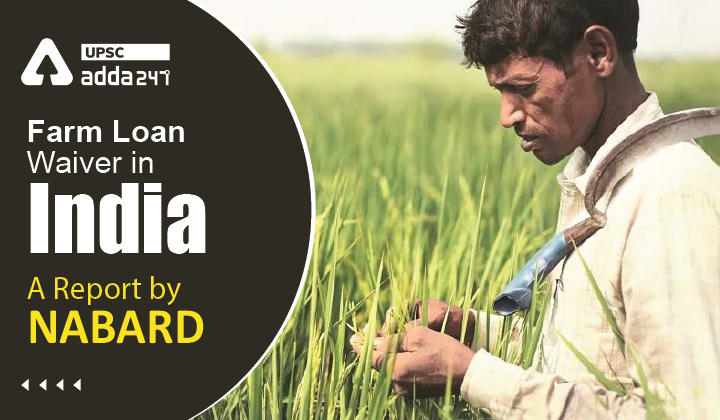Table of Contents
Farm loan waiver UPSC: Relevance
- GS 3: Issues related to direct and indirect farm subsidies
Loan waiver in India: Context
- Recently, National Bank for Agriculture and Rural Development (NABARD) and Bharat Krishak Samaj has jointly released a report on recent farm loan waivers by the three state governments— Punjab, Uttar Pradesh and Maharashtra.
NABARD report on loan waiver: Key findings
- Borrowing by states: The study revealed that an average farmer of Punjab borrows four times more money than those in Uttar Pradesh (UP) and over five times more money than those in Maharashtra.
- The study also revealed that a marginal farmer in Punjab borrows Rs 3.4 lakh annually, as compared to Rs 84,000 and Rs 62,000 in UP and Maharashtra, respectively.
- A marginal farmer is one who has the landholding of <1 ha.
- According to the report, more than 40 per cent of the “very highly” distressed farmers in these states did not receive any farm loan waiver (FLW) benefits.
- Among the three states, Punjab farmers borrowed the largest amounts per farmer category and their dependence on non-institutional sources was also the highest across all farmer categories.
- The average amount of loan taken from institutions increased with the landholding size.
- Loan waiver promoted wilful defaults: The study also revealed that the waivers increased the chances of wilful defaults by farmers and the waiver pushed even the honest farmers to default on agricultural loans.
- Institutional borrowings: Among the three states, the proportion of farmers of Punjab borrowing from the institutional sources were more than those in UP and Maharashtra.
- Interest rates: The interest rates on non-institutional loans were found to be much more than the institutional loans.
- Default on institutional loans: The possibility of default was higher on institutional loans than on non-institutional loan.
- Kisan Credit card: The diversion of KCC (Kisan Credit Card) funds for non-agricultural use was highest in the case of Punjab and lowest in the case of UP.
- The study also revealed that for an average farmer diversion of funds is inevitable and critical for survival.
- Waiver and political connections: During the election campaigns, political parties race to become the first to promise a waiver on agricultural loans.
- Moreover, these waivers are positioned as a ‘ram-baan’ solution to any distress faced by Indian farmers.
- The study has, however, revealed that despite several successive governments implementing these loan waivers, the farmer distress has become more acute, let alone reducing it.
- Effect on state finances: The study revealed that loan waivers in Punjab has affected the expenditure on other departments.
- In Punjab, both developmental expenditure and capital outlay (as a percentage of GSDP) fell due to outstanding liabilities and market borrowings.
- Reasons of farmer suicides: The study highlighted that due to restrictions imposed by COVID-19, in all the three states, successive crop loss, indebtedness and excessive reliance on agricultural income together were the prime causes of farmer suicides.
Loan waiver as a solution
- Loan waiver is not an efficient way to alleviate farmer distress and it is only a short-term solution after which farmers will go back to taking loans.
- The waivers worsened the credit discipline among the farmers in the medium and long run.
- Farm loan waivers were designed as a reaction to acute agrarian distress and to ensure the continuity of future credit but it has evolved to emerge as a political tool that is strategically used by political parties to influence rural voters.
- The design of loan waivers is such that a large section of the people whose loan should have been waived were unable to benefit from the process.
Read current affairs for UPSC





 TSPSC Group 1 Question Paper 2024, Downl...
TSPSC Group 1 Question Paper 2024, Downl...
 TSPSC Group 1 Answer key 2024 Out, Downl...
TSPSC Group 1 Answer key 2024 Out, Downl...
 UPSC Prelims 2024 Question Paper, Downlo...
UPSC Prelims 2024 Question Paper, Downlo...
